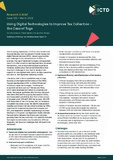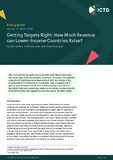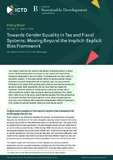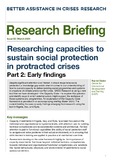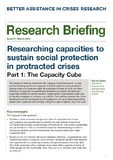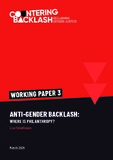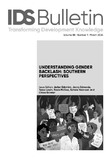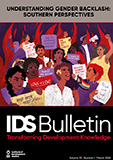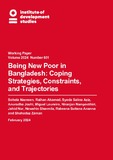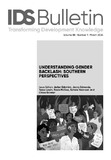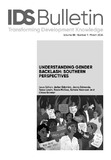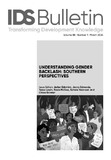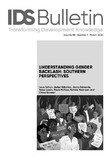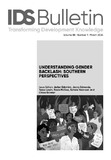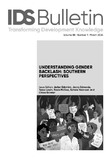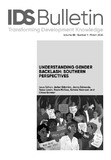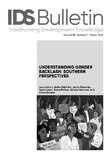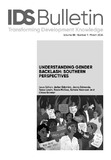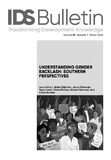OpenDocs at Institute of Development Studies: Recent submissions
Now showing items 41-60 of 17175
-
Using Digital Technologies to Improve Tax Collection – the Case of Togo
(Institute of Development Studies, 2024-03)The increasing digitalisation of African economies over the past decade, and the spread of mobile money and digital financial services (DFS), present opportunities and challenges to tax administrations in Africa. In ... -
Getting Targets Right: How Much Revenue can Lower-Income Countries Raise?
(2024-03)Lower-income countries have huge financing needs. While tackling the climate challenge and achieving the Sustainable Development Goals requires substantial capital investments, the Covid-19 epidemic has highlighted an ... -
Towards Gender Equality in Tax and Fiscal Systems: Moving Beyond the Implicit-Explicit Bias Framework
(Institute of Development Studies, 2024-03)The subject of gender and taxation has gained increasing traction in policy circles. Most existing evidence is based on the implicit and explicit bias framework developed in the mid-1990s. This framework has been useful ... -
Researching Capacities to Sustain Social Protection in Protracted Crises. Part 2: Early Findings
(Institute of Development Studies, 2024-03-06)Despite significant attention and interest in shock-responsive social protection, a knowledge gap exists when it comes to our understanding of how to sustain capacity to deliver existing social programmes and systems in ... -
Researching Capacities to Sustain Social Protection in Protracted Crises. Part 1: The Capacity Cube
(Institute of Development Studies, 2024-03-06)This research briefing introduces the Capacity Cube framework – a new tool for thinking about how capacity to deliver national social protection programmes and systems might be sustained in times of crisis. Its three-dimensional ... -
Anti-Gender Backlash: Where is Philanthropy?
(Institute of Development Studies, 2024-03-01)This working paper explores how philanthropic institutions with a history of supporting women’s and LGBTQI+ rights and democracy are seeing and responding to anti-gender backlash, and the background dynamics shaping the ... -
Notes on Contributors
(Institute of Development Studies, 2024-02-26)This is the Notes on Contributors for IDS Bulletin 55.1: Understanding Gender Backlash: Southern Perspectives -
Understanding Gender Backlash: Southern Perspectives
(Institute of Development Studies, 2024-02-26)Far from seeing continued steady progress on gender equality, we are currently witnessing significant backlash against gender and sexual rights. Limited and hard-fought gains for some are being reversed, co-opted, and ... -
Being New Poor in Bangladesh: Coping Strategies, Constraints, and Trajectories
(Institute of Development Studies, 2024-02-28)Recent studies of the Covid-19 pandemic have found that millions in Bangladesh fell into poverty during this time, and they were unable to recover to their pre-pandemic economic position. This study draws on qualitative ... -
Introduction: Understanding Gender Backlash Across Regions
(Institute of Development Studies, 2024-02-26)Whilst international policy between the mid-1990s and mid-2010s gave some hope for progress on gender equality, events since then – including conflicts, climate change, the pandemic, and an increasingly insecure world – ... -
Voice: A Useful Concept for Researching Backlash and Feminist Counter-Actions?
(Institute of Development Studies, 2024-02-26)Voice is central to claims-making and contestations around gender equality. This article engages with a diverse set of literature, social and feminist movement theory, and gender and development scholarship, to foreground ... -
Backlash and Counter-Backlash: Safeguarding Access to Legal Abortion in Brazil
(Institute of Development Studies, 2024-02-26)This article addresses the backlash against reproductive rights during Jair Bolsonaro’s government, focusing on access to legal abortions. Although access to abortion is quite restricted in Brazil, under Bolsonaro it was ... -
‘It’s a Family Matter’: Inaction and Denial of Domestic Violence
(Institute of Development Studies, 2024-02-26)This article provides a grounded example of backlash in action surrounding the implementation of the Domestic Violence (Prevention and Protection) Act 2010 in Bangladesh. While formulation and enactment of the law marked ... -
Public University Students’ Experiences of Anti-Feminist Backlash in Dhaka, Bangladesh
(Institute of Development Studies, 2024-02-26)Public university campuses in Bangladesh have been historically significant sites of negotiating with social and political orders. Based on in-depth interviews with male and female students from three public universities ... -
The Centaur’s Kick: Backlash as Disruptive Upgrades to Patriarchal Orders
(Institute of Development Studies, 2024-02-26)Backlash is not always pushing back against progress for women, but how is it still patriarchal? Sliced into three sections – on confluence, contestations, and cartographies – this article draws on a thesis about backlash ... -
Disrupting Anxious Masculinity: Fraternity as Resistance
(Institute of Development Studies, 2024-02-26)Within the experience of our work in India, context and positionality determine what we perceive as backlash against gender justice. An important underlying cause of backlash today is the widespread crisis of masculinities, ... -
Virulent Hindutva, Vigilante State: Situating Backlash and its Implications for Women’s Rights in India
(Institute of Development Studies, 2024-02-26)India is facing a period of seismic backlash against feminist and progressive politics and the pace of change, particularly over the last ten years, has been breakneck with serious consequences for women’s equality and ... -
Gender Equality vs ‘Morality’: The Erosion of Gender Agendas in Kenya
(Institute of Development Studies, 2024-02-26)This article seeks to interpret the recent erosion of gender equality agendas in Kenya through a lens of anti‑gender pushback, or patriarchal backlash. Since 2013, Kenyan governments have increasingly been appealing to ... -
Unravelling and Countering Backlash: Uganda’s Sexual Offences Legislation
(Institute of Development Studies, 2024-02-26)Considerable progress has been seen in Ugandan women’s collective advocacy for their rights since independence. Notably, women activists’ efforts in the early 1990s culminated in the institutionalisation of gender equality ... -
Queering Gender Backlash
(Institute of Development Studies, 2024-02-26)This article ‘queers’ the concept of gender backlash – troubling some of its assumptions and drawing attention to the centrality of heteronormativity to an anti-gender worldview. It argues that backlash is both episodic ...

